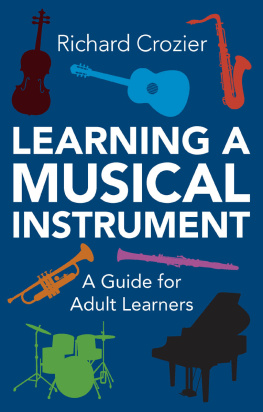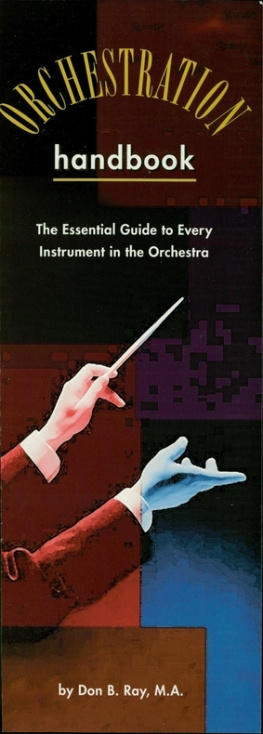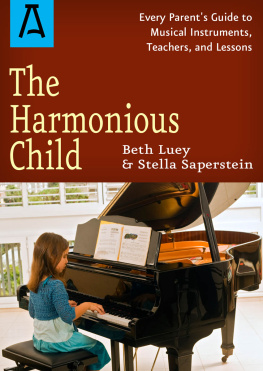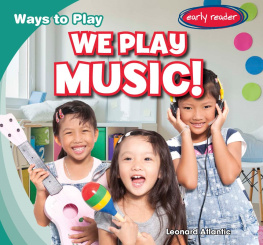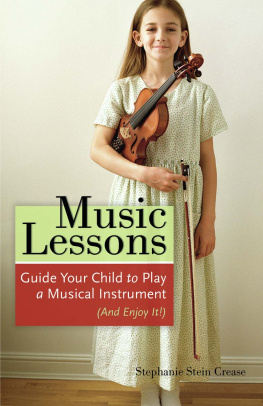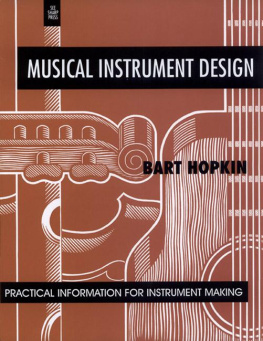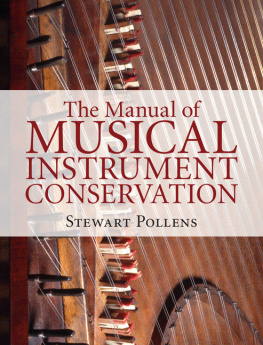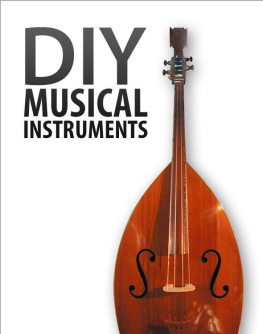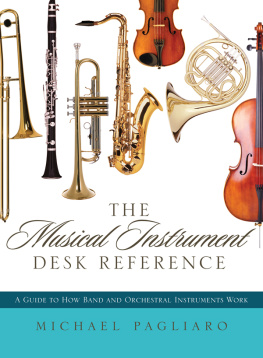LEARNING A
MUSICAL
INSTRUMENT
A Guide for Adult Learners
LEARNING A
MUSICAL
INSTRUMENT
A Guide for Adult Learners
Richard Crozier

ROBERT HALE
Contents
Introduction
This guide is for adults of all ages who are thinking about taking up a musical instrument for the first time, or who are picking up from where they left off while at school. It addresses the questions that may be in the mind of the would-be learner, such as:
- Which instrument should I choose?
- How do I find a good teacher?
- Will I be able to do it?
- Will learning music be too hard for me?
- How much will it all cost?
Learning an instrument from scratch or resuming music lessons is one of the most absorbing and exciting things anyone can do, and need hold no fear for you if you are willing to give it a go. The rewards will be numerous, without doubt.
Music exists in a huge number of different formats across almost all cultural groups, but the focus in this volume is principally on instruments used in Western classical music-making, with jazz and popular music included, and a brief look at traditional instruments and some from Indian classical music. The book includes practical information about all the commonly taught instruments, the real stories of some individuals who have taken up an instrument, a look at music education, and a glossary of terms used. Also included are a recommended reading list and compilation of web addresses for some of the many associations and organizations connected with music that are based in the UK.
CHAPTER 1
Starting your Musical Journey
STARTING FROM SCRATCH OR PICKING UP THE THREADS
Perhaps you are one of those people who have never really experienced the joy of music, but just feel that you know instinctively that it is worth finding out some more about it or maybe you began engaging in some form of music-making when you were at school, but for all sorts of reasons it has just dropped out of your life, or you chose to drop it from your regular pattern of activities.
Music makes human beings human: it is a much older form of communication than reading and writing, and it deals directly with your emotions, rather than facts or information about them. It is a form of self-expression that can also be a form of communication. As a form of communication it has the advantage of allowing you, as a composer, to say what you want to say, but it also allows the listener to hear what they want to hear, and allows a performer to make the music express what they want it to express. There is no other art form that works in quite the same way as music, because music only exists while it is being performed and while you listen to it. The rest of the time it may be stored in another format, such as digitally, on vinyl, on CD or on paper, but you can only hear it when it is performed or when a recording of it is played.
It really doesnt matter if you are not a great performer: the important thing is that you make music at your own level. The reality is that even the greatest performers and composers werent great when they started even child prodigies had to begin somewhere. As you begin to learn music through playing or singing you will gain a heightened awareness of the attainment of greater performers, and an insight into what the greatest performers are capable of.
So, lets begin with a few questions to provoke some thinking and get the ball rolling:
- Do you remember your class music lessons from your school days?
- Do you remember more of music in your primary or your secondary school?
- Did you enjoy your music lessons?
- Can you recall anything musical that you learnt from those lessons?
- Did you take part in any musical groups in school time?
- Did you take part in any music-making out of school?
- Do you listen to music now? If you do, is it live or recorded?
- Do you take part in any form of music-making now?
- Do you sometimes imagine yourself playing a musical instrument. If so, which one?
- What sort of music do you like: jazz, pop, classical, world, other?
In conversation adults are often heard to say that they wish they had been given the opportunity to learn a musical instrument, or that they had persevered with the instrument they did start learning when they were at school. This book will help you if those thoughts are in your mind, or if you just have an idea that youd like to make some music. Theres no reason why anyone shouldnt be able to make reasonable progress learning an instrument, especially with the help of a good teacher and some time dedicated to practise. After all, playing, composing and listening to music are natural and enjoyable activities, and learning to play music well on an instrument, or taking part in some sort of choral group, should also be an enjoyable activity, and will be, if the teaching style and instrument are right for you, the learner. If you started lessons at school but didnt get very far, why not give it another go and see if you can take it a few steps further?
In the past, learning music in a school environment often meant learning information about music. It is much easier for music teachers to teach factual information about composers, pieces of music, musical notation, musical theory, instruments and so on, than to get a whole class of children involved in practical music-making. And in one sense it is easier for learners to learn this way, and then to be tested on whether they have remembered the facts they have been given. Unfortunately that sort of teaching and learning does nothing to satisfy our natural desire to make music of whatever kind we choose. Sadly, many people remember more about the less musical aspects of their musical encounters at school, and in contrast remember the joy, delight and excitement of discovering and following, say, pop music, which they did for themselves, and from which they took enjoyment as much by being listeners as participants.
This book is all about encouraging you to embrace practical music-making in whatever musical genre appeals most to you, regardless of any of your musical experiences in the past.
If your experience of classroom music was less than wholly positive, or if you began learning to play an instrument but lost interest, or had too much pressure on your time, then there is no better time than the present to put things right. Whatever style of music appeals to you, and whichever instrument you would like to play, theres no reason to hold back from having a go. You can learn a lot about music through learning to make and control sounds on an instrument, without wanting, or being able to be, the greatest performing musician on that instrument. Once you get started, you may find that your interest moves more towards composition, or towards working with sounds electronically. Effective instrumental teachers teach music through the instrument, rather than just teaching the technique that you need in order to play the instrument itself.
Learning to play an instrument describes the journey from simply making a sound, to acquiring control over sound and tone production, fluency as a performer, and in many cases, confidently reading written musical notation. Perhaps very few people, if any, truly complete the journey, but whether you progress just a few steps along the way, or enjoy some truly long-haul travel, it should bring you enormous satisfaction. This book provides some information and suggestions to help anyone who is embarking on that journey.
DOES AGE MATTER?
When it comes to learning to play a musical instrument, age really does not matter. Starting the violin or piano at the age of five does mean that your fingers are more flexible, and yes, it does get a little harder, in that respect, the older you are but the compensating advantage of age is being able to understand why its a little more difficult, and knowing how to pace yourself on your learning journey. It is most certainly never too late. When it comes to your choice of instrument, rather than focusing on its size or shape, it may be as helpful and important to focus on your gut reaction to the sound and sight of the instrument, and the music you have heard being made on it. There is research evidence to show that individuals with certain temperaments are more likely to be suited to particular instruments, so dont be afraid of being guided by your feelings and intuition, as well as keeping an eye on some of the practicalities.
Next page
